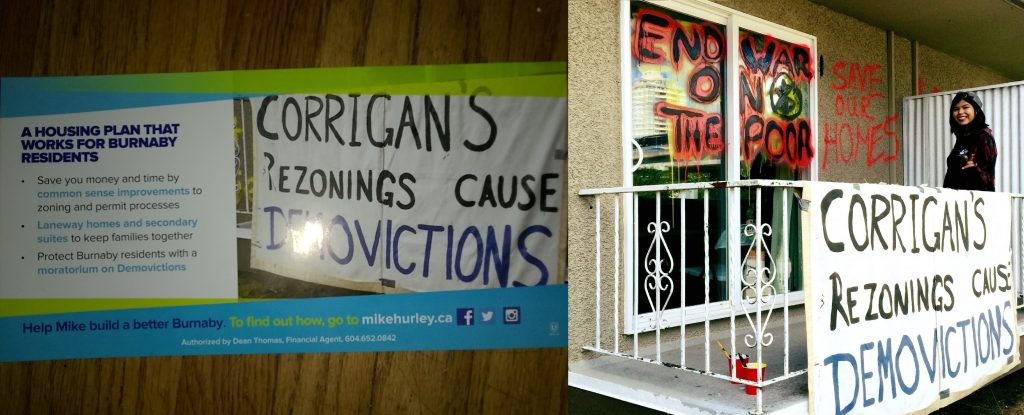
Part 1: Free market fundamentalism / Progressives compete on a narrow political field
Free market fundamentalism
In Vancouver the electoral right has a slough of pretenders that are competing for who can marshall the strongest free market slogan: YIMBY, upzoning, legalize housing… The tactic is the same: they want to pour gasoline on the fire of Vancouver’s real estate bonanza so that the flames burn hotter and longer, engulfing more and more people. This supply-side wizardry is based on the myths that the market knows best, that the problem is government regulations that slow market development, and that real estate is a special sort of commodity that will spread to benefit all – if only developers can increase the supply of condos and market rental apartments. But just as producing more cars will not improve public transit, building more condos will not house the homeless.
Progressives compete on a narrow political field
Electoral-progressives also make up a crowded market. The group of four main parties of Vancouver’s electoral-progressive scene, COPE (including the former Team Jean campaign), the Greens, OneCity, and Vision, have agreed to a non-competition clause that has reduced their critique of each other, but have not formed a formal coalition. The non-competition agreement brokered by the Vancouver and District Labour Council (VDLC) in June has guided the number of candidates each group has put forward and has tempered their platforms. “Under the agreement,” a release from the VDLC read, “no party will have more than 4 Council candidates.” The VDLC agreement is supposed to “ensure that parties are free to criticize each others’ records and policies,” but it has had the effect of dampening political differences.
The Vancouver Greens, One City, COPE, and Vision are campaigning separately but on such similar platforms that it would be hard to tell them apart on a blind platform test. The Team Jean and COPE campaign has proven best equipped to differentiate itself, using social movement tactics of performative arrests, slogans and graphics, and old fashioned door knocking and tabling on street corners. But this differentiation has been based on style more than substance. Although each party has its own quirk, they are all calling for modest increases in taxes on estate owners in order to build temporary housing for the poor in the model of the BC Liberals’ institutional “supportive” housing. They are also all in favour of some minor rejigging of the status quo of renters’ rights. Based on their programs alone, there is no good reason for these four parties not to form a coalition. The reason they don’t is because each group is jealous of its brand, and the politics of the electoral-progressive field is so narrow that minor differences of style, “quirks,” or ways of wording platforms end up confusing and dividing otherwise equivalent parties.

Hurley poaches grassroots imagery and waters down our message.
Another version of this conflict between free market fundamentalism and inoffensive pacifist reforms is playing out in Burnaby, which is the exception amongst suburban cities for also hosting a Vancouver-style right-wing versus progressive conflict around housing. This dynamic is a result of the years-old social movement struggle in Metrotown against the mass displacement and gentrification policies of mayor Derek Corrigan and his NDP-affiliated Burnaby Citizens Association (BCA) Party. A left field of reforms that would depress and restrain market forces has been opened up by renters in the Stop Demovictions Burnaby campaign (which Alliance Against Displacement helps to organize). Some electoral advocates of inoffensive reforms have seized the opportunity of that opening. The Burnaby Green Party and independent Mayoral candidate Mike Hurley are proposing a watered-down version of the demands mounted by the grassroots; their moratorium on demovictions may rehouse some existing residents but will continue Corrigan’s programme of the gentrification of the majority-renter community in Metrotown, as it leaves the market untouched. Organizers with Stop Demovictions Burnaby unpacked this analysis further in an article published in August calling for “more than a moratorium” and explaining the need to keep organizing against evictions in the streets.
